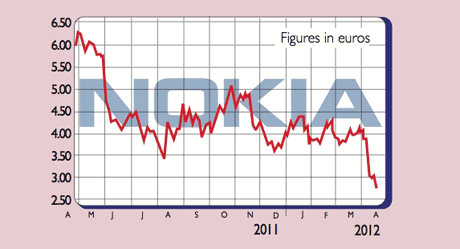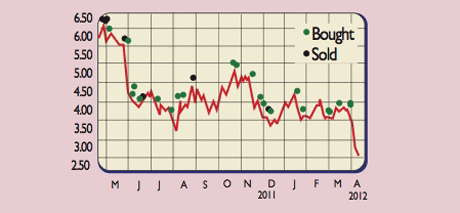Shares in focus: A toppled tech king
Nokia was one of the world's most valuable brands in the 2000s. But the mobile phone maker has since fallen on hard times. Can it relive the glory days? Phil Oakley investigates.
Get the latest financial news, insights and expert analysis from our award-winning MoneyWeek team, to help you understand what really matters when it comes to your finances.
You are now subscribed
Your newsletter sign-up was successful
Want to add more newsletters?

Twice daily
MoneyWeek
Get the latest financial news, insights and expert analysis from our award-winning MoneyWeek team, to help you understand what really matters when it comes to your finances.

Four times a week
Look After My Bills
Sign up to our free money-saving newsletter, filled with the latest news and expert advice to help you find the best tips and deals for managing your bills. Start saving today!
Can Nokia regain its crown? Probably not, says Phil Oakley.
The business
Nokia designs and makes mobile phones and smartphones. It also makes digital maps and the software that is used in mobile navigation products. It has a joint venture with Siemens where the main activity is providing equipment and services to mobile phone networks.
The history
The company began its life in 1865 when mining engineer Fredrik Idestam set up a wood pulp mill in southwest Finland. He opened a second mill on the banks of the Nokianvirta river, from which the company got its name, in 1871.
MoneyWeek
Subscribe to MoneyWeek today and get your first six magazine issues absolutely FREE

Sign up to Money Morning
Don't miss the latest investment and personal finances news, market analysis, plus money-saving tips with our free twice-daily newsletter
Don't miss the latest investment and personal finances news, market analysis, plus money-saving tips with our free twice-daily newsletter
By the 1920s, Nokia's interests had expanded into the rubber and cable industries. In the 1960s, Nokia made its first foray into electronics when it started making radio telephones for the Finnish army. It then went on to make popular models of computers and by the late 1980s had become the third-largest TV manufacturer in Europe.
But it was mobile phones that transformed the company. Nokia made its first car phone in 1982 and followed this with a handheld mobile phone in 1987. During the 1990s, Nokia became the world leader in mobile phones. By the mid 2000s, it had established itself as one of the world's most valuable consumer brands.
However, in recent years the company has fallen on hard times. It has failed to adapt to changes in mobile phone technology and is now losing money. It is putting its faith in a partnership with Microsoft to develop a powerful alternative mobile operating system to compete with Apple and Google.
The chief executive
Stephen Elop has been chief executive since 2010. Prior to joining Nokia he was the head of Microsoft's business division. There, amongst other things, he was responsible for Microsoft Office products. Elop hit the headlines at Nokia after he sent an internal memo to staff that was leaked to the media.
In the memo, he lambasted the internal workings of the firm and compared it with a man standing on a burning oil platform in the North Sea. The surrounding flames were Nokia's competitors, who were rapidly taking the company's customers away. It seems that Elop is still working out how to save Nokia from the flames.
Should you buy the shares?
Nokia is a stark reminder to investors of how quickly fortunes can change in the technology business. Like BlackBerry maker Research in Motion, Nokia has been too slow to react to the rise of Apple's iPhone and Google's Android phones. To turn itself around, it has to do something that the competition does not. It looks doubtful whether it can.
Its new Nokia Lumia phones are using Windows 7 phone technology, but initial sales have been disappointing while rivals' phones have done well. Even Nokia's cheaper feature phones are being ravaged by low-end smartphones and cheap Chinese competition.
Could Microsoft buy Nokia? Given the use of Microsoft's mobile operating system and Elop's previous career at the firm, some commentators think this might be possible. The argument is based on giving Microsoft more presence in the smartphone market. With most businesses still using Windows and MS Office, using Nokia to sell Windows smartphones to businesses would be a good idea. Yet firms seem to be coping fine using other handsets and operating systems.
So what does the future hold? Nokia still has cash on its balance sheet, so it can cope with losing money for a while yet. But it will have to move fast or see itself confined to the annals of technology history. The shares are risky. We'd avoid them.
The numbers

Stockmarket code: NOK1V
Share price: €2.74
Market cap: €10.3bn
Net assets (Mar 2012): €10.9bn
Net cash (Mar 2012): €4.6bn
P/e (2013 estimate): 28.9
Yield (2013 estimate): 5.5%
What the analysts say
Buy: 4
Hold: 19
Sell: 5
Average price target: €4.48
Director Shareholding

J Ollila: 791,284
S Elop: 150,000
T Ihamuotila: 62,894
Get the latest financial news, insights and expert analysis from our award-winning MoneyWeek team, to help you understand what really matters when it comes to your finances.
Phil spent 13 years as an investment analyst for both stockbroking and fund management companies.
-
 Early signs of the AI apocalypse?
Early signs of the AI apocalypse?Uncertainty is rife as investors question what the impact of AI will be.
-
 Reach for the stars to boost Britain's space industry
Reach for the stars to boost Britain's space industryopinion We can’t afford to neglect Britain's space industry. Unfortunately, the government is taking completely the wrong approach, says Matthew Lynn